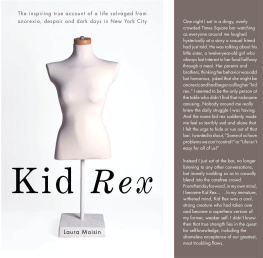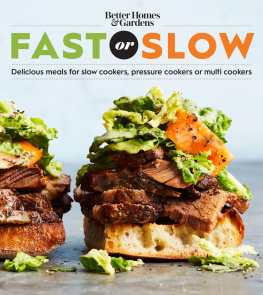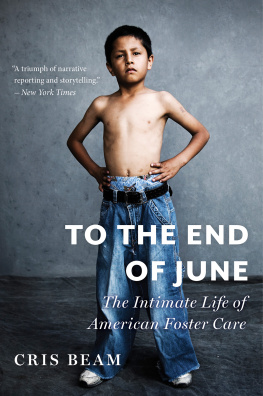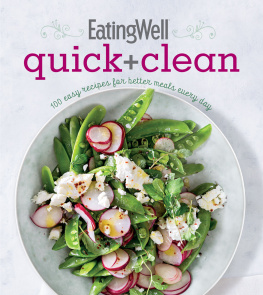Acknowledgments
I would like to thank my publisher and all of the people who have worked tirelessly to make this book possible, including Jack David, Crissy Boylan, and Gil Adamson. A special thanks to Jen Hale for appreciating my message and representing me so well.
To Steven Levenkron for teaching me how to understand myself.
To my aunt and uncle, Lia and Andi, and my cousins Teo and Alex for loving me unconditionally.
To Josh for his love, fierce devotion, and enlightening friendship.
To Brett for giving me the courage to love again, fully. You are the amazing part of my next, unwritten chapter.
To Michael V (Buffa) for becoming my brother, friend, personal photographer, and baking devotee.
To my dad, Michael, for persistently teaching me what it is to have faith, trust, hope, and courage. He is my pietra.
To my mom and best friend, Michaela, for following me into the depths of despair and coming back out with me. She is the Beatrice to my Dante.
To my grandmother, Elena: the quiet warrior. My world is a better place because of what she taught me through her gently whispered words and fearless actions.
And I would especially like to thank Fran, my brilliant and beautiful sister, twin, other half and first editor. If this book has any value as a written work it is because of her input and guidance along every step and through the years it took us to complete. She has always given me her utmost protection and perpetual felicity, and I kindly ask her to never get out of my head.
Chapter One
Two Blocks Below Canal
Lo and beholdwhat is the latest nutritional value of salvation?
Save the Rainforest, Reindeer, Rain Makers, on every back-boxed, industrialized carton of cereal.
Aisle for aisle, pound for pound, with each roaring, deafening, thunder-smash pour of ultra-pasteurized, ultra-sanitized milk. Spoonful by spoonful. How, then, should I save myself if this chomping existence is based solely on consumption and reduction?
Energy burner and calorie counter alike, one and allits the new price for simulated opportunity.
My life in Chinatown marked the early stages of my disorienting anorexic existence. The summer I was set to return to NYU for my sophomore year I got a letter informing me I would be living with my freshman year roommate, Miranda, my best friend Stella, and a fourth person we didnt yet know. I also found out that my apartment was at Lafayette and White streets, in the heart of Chinatown. I had stayed in Chinatown only once with my mom, the summer of my freshman year orientation, and wed both been a little frightened by our experience. We quickly switched our accommodations upon taking one good look at the dingy, narrow, winding streets. People navigated them so naturally compared to us. Going into my sophomore year and already somewhat accustomed to the eccentricities of New York City, I was decidedly less worried about my surroundings and more concerned about the number of people I could fit into my new apartment for parties.
On the first day of my Chinatown life, we packed the family SUV with my college belongings. I drove from Boston to New York with my parents, my sister Francesca, or Fran, and her boyfriend, Rick. My boyfriend Josh had just begun his senior year at JMU and was unable to accompany us. While Rick helped my dad with the heavy lifting and moving, my mom and Fran helped me put my clothes and books neatly away. We had to work around the wreckage Stella had wrought during a party shed hosted the night before. The rest of the apartment was a perfect picture of college chaos, complete with overflowing garbage cans, discarded beer cups, an empty fridge, strangers passed out on the couch, and loud music blasting from the other bedrooms. This was a picture of the lifestyle I would live all year, and the rest of that day would prove to be similarly symbolic.
While eating lunch with my dad at a nearby restaurant Rick found a clump of hair in his garlic chicken that forever spoiled his taste for Chinatown. As I unpacked with my mom and Fran they munched on sandwiches that I refused to touch. I remember their puzzled looks about my attitude: skipping a meal because I was too busy was normal. Part of me knew, however, that this desire to refuse food was not born solely from my eagerness to get settled. But at that point, I didnt understand what was really happening.
Life in Chinatown was erratic. As soon as my family left, my friends from freshman year began to trickle in, and before long we were all camped out on the wood floor catching up and drinking. The people whod been there a week were already living off of McDonalds takeout. Apparently McDonalds would deliver to residents of Chinatown, though, at the time, they did not deliver to any other part of Manhattan. None of us knew why exactly delivery was available exclusively to our neighborhood, but most of my friends agreed that it was a welcome convenience.
Those few days before the commencement of classes were spent in disarray. I liked to think that I was living a cool bohemian life. In fact, anytime I feared my lifestyle might be destructive, I excused it by calling it boho, hipster, or indie. I liked the fact that my apartment was a mess, that there was never any food in the fridge, and that people were camped permanently on our sofa, loveseat, armchair, and floor. There was so little space and so many vagabonds. I liked the fact that I could go out and party as much as I wanted and still manage to wake up and accomplish daily tasks.
Freshman year had seemed so long and challenging, as I tried to figure things out, adapt to my surroundings, and make friends. But by sophomore year I had only one goal: party as much as possible and still do well in school. That year went by like a blurry dream. For a while my plan worked. I went out almost every night, had fun with my friends, and continued to perform well in my most difficult classes. I seemed to have a never-ending supply of energy, but in the rare moments when I paused and tried to look inward I knew something was seriously, dangerously amiss. I was afraid to admit that the real source of my boundless energy was my developing addiction to starvation. Infatuated with anorexia, it started to become my drug, and like most drugs will, it lit an artificial fire within me.
My addiction really began that year in Chinatown. The high my anorexia gave me, along with self-confidence, self-worth, and freedom I felt when not eating, made it seem like I was in control of everything. While everyone around me required food on a regular basis, I was strong enough to need none.
A few times, late at night, I remembered an intervention that had taken place at my old high school in Newton. I had been nearly dragged into the assistant head mistresss office and interrogated about my abstinence from eating. By then, my senior year of high school, I had built a very rigid lifestyle that was beginning to crack.
I realize now the problem was that I felt I had to be the best at everything I did: in high school it was academics; in college it was starvation. One problem bled into the other, because loading my high school schedule with the most difficult classes and indulging a need to get As left me with little time for sleeping or eating. Eating, during my senior year of high school and for the first time in my life, had become an option and not a requirement. I began to do my homework on the treadmill, thinking that it would alleviate my constant anxiety.
My parents had been at a loss for what to do. My dad had begged me not to move to New York, failing to realize that my problem was internal and would manifest itself regardless of where I lived. After the intensity of my last semester at Newton, he wanted me close by where I could be monitored, but I didnt heed his requests. For several years he occasionally blamed my mom for Letting Laura move to that stupid city!








